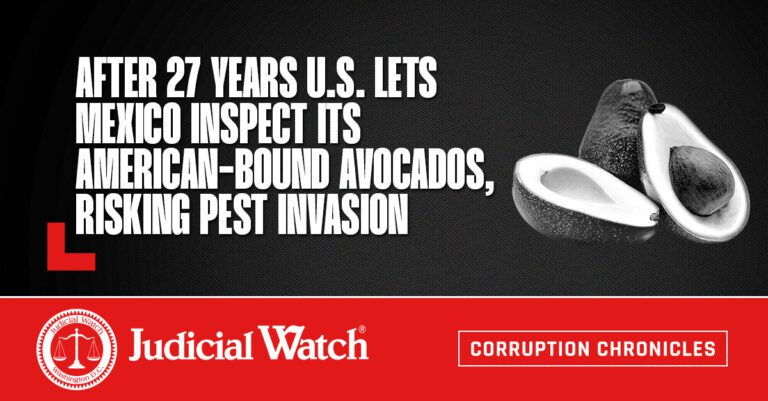

After 27 Years U.S. Lets Mexico Inspect its American-Bound Avocados, Risking Pest Invasion


After nearly three decades of ensuring that Mexican avocado imports are not infected with insects and diseases that could destroy American growers, U.S. agriculture inspectors are being pulled from Mexico and the critical vetting will be conducted by locals south of the border. The surprising move, announced recently by the Mexican government, was kept under the radar by the Biden administration and the thousands of commercial growers in this country who will be most heavily impacted learned about it in an English-language Mexican news site. The recent pact to transfer inspections to Mexican workers after so many years shows the confidence that the U.S. has in their product, the Mexican government writes in its announcement. “With this agreement the United States recognizes the commitment of Mexican producers, who for more than 27 years have not had sanitary problems in the exportation process,” Mexican officials say.
That is because inspectors from the U.S. Department of Agriculture’s (USDA) Animal and Plant Health Inspection Service (APHIS) used a multi-step process to vet the shipments, assuring the avocados were safe to bring into the country. Mexico is the world’s largest avocado producer, and the United States is by far its biggest customer. In 2024 Mexico’s avocado production is forecasted at 2.77 million metric tons, according to the USDA, and 81% of it is going to the U.S. Last year $2.7 billion in Mexican avocados came into the country. Around 73% of the Latin American nation’s avocados are grown in Michoacan, a western state well known for drug cartel violence. In 2022 a USDA inspector was threatened after questioning the integrity of an avocado shipment and refusing to certify it. Earlier this year the U.S. suspended inspections of avocado and mango shipments after two USDA employees were assaulted and held by assailants in Michoacan. A week later the U.S. Ambassador to Mexico, Ken Salazar, said inspections would resume to “eliminate the impediments to the trade of avocado and mango to the United States from Michoacan.”
A few months later the Biden administration quietly delegated the critical task to the Mexican government, which is famously corrupt and should not be trusted. Avocado production is essential to Mexico’s economy and it generates a lot of jobs, according to the government’s recent announcement. That gives the U.S. tremendous leverage to assure the safety of its inspectors if indeed that is why the USDA is making such a senseless change to a system that has had tremendous success for so many years. American growers are outraged and say they have everything to lose if Mexican inspectors do not perform the job correctly. In a letter to USDA Secretary Thomas J. Vilsack the California Avocado Commission, which represents nearly 2,000 commercial growers, writes that the change reverses the long-established inspection process designed to prevent invasions of known pests in Mexico that would devastate their industry. “This process was the foundation for the initial decision allowing the importation of avocados from Mexico into the United States,” the group writes, adding that pulling USDA inspectors appears to be a politically driven decision.
The pest prevention program adopted by the USDA decades ago has worked in large measure because APHIS inspectors have been directly involved in all significant aspects of the program’s operation beginning with orchard certification, the California Avocado Commission confirms. “It is well known that their physical presence greatly reduces the opportunity of others to game the system,” says the letter to Vilsack, who was also Obama’s USDA secretary. “What assurances can APHIS provide us that its unilateral reversal of the process will be equal to or better than what has protected us?” the growers ask Vilsack. The trade group adds that it is looking for specifics as to why the USDA has concluded that substituting American inspectors with Mexican government inspectors is in their best interest. “Discontent with your decision and disregard of our industry is growing by the hour,” the commission writes in its letter to the nation’s agriculture secretary.















